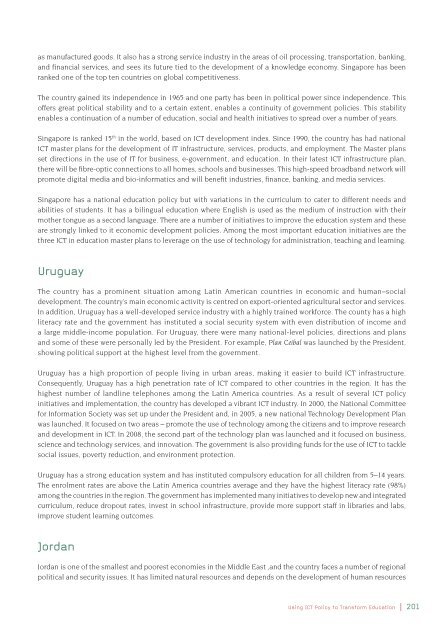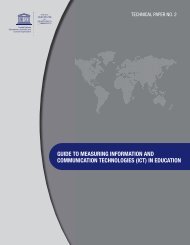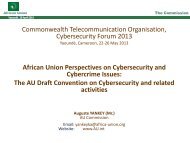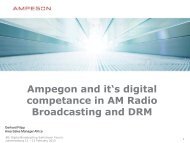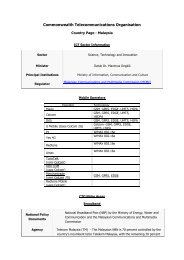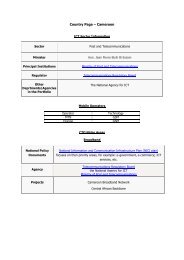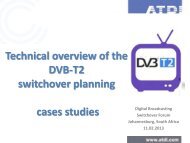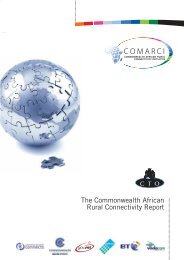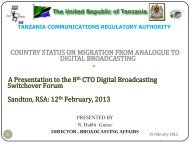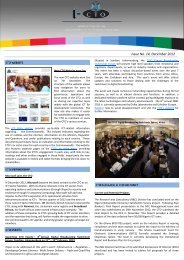Transforming education: the power of ICT policies - Commonwealth ...
Transforming education: the power of ICT policies - Commonwealth ...
Transforming education: the power of ICT policies - Commonwealth ...
You also want an ePaper? Increase the reach of your titles
YUMPU automatically turns print PDFs into web optimized ePapers that Google loves.
as manufactured goods. It also has a strong service industry in <strong>the</strong> areas <strong>of</strong> oil processing, transportation, banking,<br />
and fi nancial services, and sees its future tied to <strong>the</strong> development <strong>of</strong> a knowledge economy. Singapore has been<br />
ranked one <strong>of</strong> <strong>the</strong> top ten countries on global competitiveness.<br />
The country gained its independence in 1965 and one party has been in political <strong>power</strong> since independence. This<br />
<strong>of</strong>fers great political stability and to a certain extent, enables a continuity <strong>of</strong> government <strong>policies</strong>. This stability<br />
enables a continuation <strong>of</strong> a number <strong>of</strong> <strong>education</strong>, social and health initiatives to spread over a number <strong>of</strong> years.<br />
Singapore is ranked 15 th in <strong>the</strong> world, based on <strong>ICT</strong> development index. Since 1990, <strong>the</strong> country has had national<br />
<strong>ICT</strong> master plans for <strong>the</strong> development <strong>of</strong> IT infrastructure, services, products, and employment. The Master plans<br />
set directions in <strong>the</strong> use <strong>of</strong> IT for business, e-government, and <strong>education</strong>. In <strong>the</strong>ir latest <strong>ICT</strong> infrastructure plan,<br />
<strong>the</strong>re will be fi bre-optic connections to all homes, schools and businesses. This high-speed broadband network will<br />
promote digital media and bio-informatics and will benefi t industries, fi nance, banking, and media services.<br />
Singapore has a national <strong>education</strong> policy but with variations in <strong>the</strong> curriculum to cater to different needs and<br />
abilities <strong>of</strong> students. It has a bilingual <strong>education</strong> where English is used as <strong>the</strong> medium <strong>of</strong> instruction with <strong>the</strong>ir<br />
mo<strong>the</strong>r tongue as a second language. There are a number <strong>of</strong> initiatives to improve <strong>the</strong> <strong>education</strong> system and <strong>the</strong>se<br />
are strongly linked to it economic development <strong>policies</strong>. Among <strong>the</strong> most important <strong>education</strong> initiatives are <strong>the</strong><br />
three <strong>ICT</strong> in <strong>education</strong> master plans to leverage on <strong>the</strong> use <strong>of</strong> technology for administration, teaching and learning.<br />
Uruguay<br />
The country has a prominent situation among Latin American countries in economic and human–social<br />
development. The country’s main economic activity is centred on export-oriented agricultural sector and services.<br />
In addition, Uruguay has a well-developed service industry with a highly trained workforce. The county has a high<br />
literacy rate and <strong>the</strong> government has instituted a social security system with even distribution <strong>of</strong> income and<br />
a large middle-income population. For Uruguay, <strong>the</strong>re were many national-level <strong>policies</strong>, directions and plans<br />
and some <strong>of</strong> <strong>the</strong>se were personally led by <strong>the</strong> President. For example, Plan Ceibal was launched by <strong>the</strong> President,<br />
showing political support at <strong>the</strong> highest level from <strong>the</strong> government.<br />
Uruguay has a high proportion <strong>of</strong> people living in urban areas, making it easier to build <strong>ICT</strong> infrastructure.<br />
Consequently, Uruguay has a high penetration rate <strong>of</strong> <strong>ICT</strong> compared to o<strong>the</strong>r countries in <strong>the</strong> region. It has <strong>the</strong><br />
highest number <strong>of</strong> landline telephones among <strong>the</strong> Latin America countries. As a result <strong>of</strong> several <strong>ICT</strong> policy<br />
initiatives and implementation, <strong>the</strong> country has developed a vibrant <strong>ICT</strong> industry. In 2000, <strong>the</strong> National Committee<br />
for Information Society was set up under <strong>the</strong> President and, in 2005, a new national Technology Development Plan<br />
was launched. It focused on two areas – promote <strong>the</strong> use <strong>of</strong> technology among <strong>the</strong> citizens and to improve research<br />
and development in <strong>ICT</strong>. In 2008, <strong>the</strong> second part <strong>of</strong> <strong>the</strong> technology plan was launched and it focused on business,<br />
science and technology services, and innovation. The government is also providing funds for <strong>the</strong> use <strong>of</strong> <strong>ICT</strong> to tackle<br />
social issues, poverty reduction, and environment protection.<br />
Uruguay has a strong <strong>education</strong> system and has instituted compulsory <strong>education</strong> for all children from 5–14 years.<br />
The enrolment rates are above <strong>the</strong> Latin America countries average and <strong>the</strong>y have <strong>the</strong> highest literacy rate (98%)<br />
among <strong>the</strong> countries in <strong>the</strong> region. The government has implemented many initiatives to develop new and integrated<br />
curriculum, reduce dropout rates, invest in school infrastructure, provide more support staff in libraries and labs,<br />
improve student learning outcomes.<br />
Jordan<br />
Jordan is one <strong>of</strong> <strong>the</strong> smallest and poorest economies in <strong>the</strong> Middle East ,and <strong>the</strong> country faces a number <strong>of</strong> regional<br />
political and security issues. It has limited natural resources and depends on <strong>the</strong> development <strong>of</strong> human resources<br />
Using <strong>ICT</strong> Policy to Transform Education | 201


